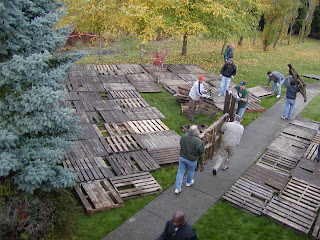Two years ago in D.C., I was walking home one evening post work, passing by the homeless people who I had passed by every day before. It was winter and as I approached the CVS, I walked past the man who was regulary there, perched on his plastic milk crate. As I walked up and past him, I watched as he rubbed his very swollen-looking feet and put them back into his grimy shoes. He had no socks and it was cold. Very cold. While watching this, the only thing I could think about was how much I hate putting my feet into shoes or socks with dirt in them, that gritty, sandy feeling that just feels so unpleasant. And so, while I normally never give money to folks who ask on the street, I decided, at that moment, that I would run into CVS and buy this guy some new socks so he wouldn't have to continue experience that gritty feeling that I have such a personal aversion to.
I purchased the socks, and came back out, eager to present my offering, so pleased with myself for thinking of being kind. I approached him and shared, earnestly, "Here, I thought your feet might be cold so I bought you some socks."
The guy looked at me in return and said, "Do you have any money?"
Shocked that he wasn't excited to have clean socks, I repeated my offer, "Well no, but I bought you socks."
The man took them after I insisted another time, and then went right back to rattling his cup of change at passer-bys. I felt defeated and frustrated. I had gone out of my way and spent my money and time to buy him socks. And when he didn't want them, I had had to convince him that I knew what he needed to get him to agree to accept them. I wanted other passer-bys to see my generousity.
The total action had been entirely about me- my hate for toe grit and cold feet and my need to be seen and recognized for my supposed kindness.
I've thought about and retold this story quite a bit since it happened and each time, am more aware of my problematic assumptions and paternalism. I haven't tried to buy socks for someone again. But I've mostly ignored the pleas for money while walking down the street as well, meaning I pretty much ignore the people making the pleas too. It's often easier to pretend you just don't see them or hear them, to offer a quick "Sorry," and walk on.
However, I had the opportunity to engage in a meeting yesterday that has since changed my thoughts. I was lucky to catch Mimi, a Seattle-based artist, before she heads out to Mt. Rainier for three months, to pick her brain about her three month project where she lived as a Tent City 3. I had initially hoped to learn about how best to advertise the interviews, recruit women to participate, and present myself (a serious question of what to wear!- jeans or businessy). But I took away some incredibly helpful reflections from my conversation with Mimi as well. Most of all, she reminded me of who the people living in TC3 and on the streets of Seattle are. Mimi shared that two female residents of TC3 were pregnant, one couple had gotten married and numerous others had life stories full of impressive accomplishments such as violinists with globally-performing orchestras, aspiring poets, and idea-laden entrepeneurs.
She also shared that TC3 has even stricter rules that I had thought (not just zero tolerance policies for substance abuse or failing to perform your assigned security shift). As a resident, Mimi was not allowed to be seen loitering in the neighborhood- which meant no sitting on a bench on the church property and no requesting a local bookstore host a bookclub for residents. And when the residents embarked on their regular, silent meditation walk around the neighborhood (a past site) on Christmas morning, a woman wearing a Santa cap trotted onto her front lawn and yelled at the folks walking by, "I pay to live here."
A city ordinance which allows TC3 to reside in neighborhoods brings with it a challenging contrast: how much dignity should be sacrificed to create this living space? How do you balance the needs of community members with the needs of new, temporary community members? And what sacrifices are ok?
And so Mimi's suggestion, when passing folks on the street, is simply to smile and exchange a hello. A recognition of someone as an individual, while not enabling them to purchase material goods, helps reaffirm that they're there, that they're part of this city too.


































